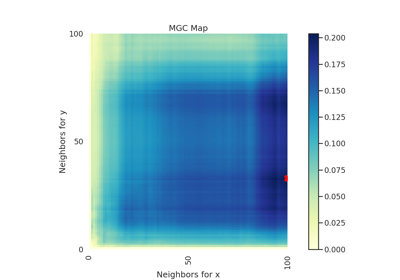RV¶
-
class
hyppo.independence.RV¶ Rank Value (RV) test statistic and p-value.
RV is the multivariate generalization of the squared Pearson correlation coefficient [1]. The RV coefficient can be thought to be closely related to principal component analysis (PCA), canonical correlation analysis (CCA), multivariate regression, and statistical classification [1]. The statistic can be derived as follows [1] [2]:
Let \(x\) and \(y\) be \((n, p)\) samples of random variables \(X\) and \(Y\). We can center \(x\) and \(y\) and then calculate the sample covariance matrix \(\hat{\Sigma}_{xy} = x^T y\) and the variance matrices for \(x\) and \(y\) are defined similarly. Then, the RV test statistic is found by calculating
\[\mathrm{RV}_n (x, y) = \frac{\mathrm{tr} \left( \hat{\Sigma}_{xy} \hat{\Sigma}_{yx} \right)} {\mathrm{tr} \left( \hat{\Sigma}_{xx}^2 \right) \mathrm{tr} \left( \hat{\Sigma}_{yy}^2 \right)}\]where \(\mathrm{tr} (\cdot)\) is the trace operator.
The p-value returned is calculated using a permutation test using
hyppo.tools.perm_test.
Methods Summary
|
Helper function that calculates the RV test statistic. |
|
Calculates the RV test statistic and p-value. |
-
RV.statistic(x, y)¶ Helper function that calculates the RV test statistic.
-
RV.test(x, y, reps=1000, workers=1)¶ Calculates the RV test statistic and p-value.
- Parameters
x,y (
ndarray) -- Input data matrices.xandymust have the same number of samples and dimensions. That is, the shapes must be(n, p)where n is the number of samples and p is the number of dimensions.reps (
int, default:1000) -- The number of replications used to estimate the null distribution when using the permutation test used to calculate the p-value.workers (
int, default:1) -- The number of cores to parallelize the p-value computation over. Supply-1to use all cores available to the Process.
- Returns
Examples
>>> import numpy as np >>> from hyppo.independence import RV >>> x = np.arange(7) >>> y = x >>> stat, pvalue = RV().test(x, y) >>> '%.1f, %.2f' % (stat, pvalue) '1.0, 0.00'
